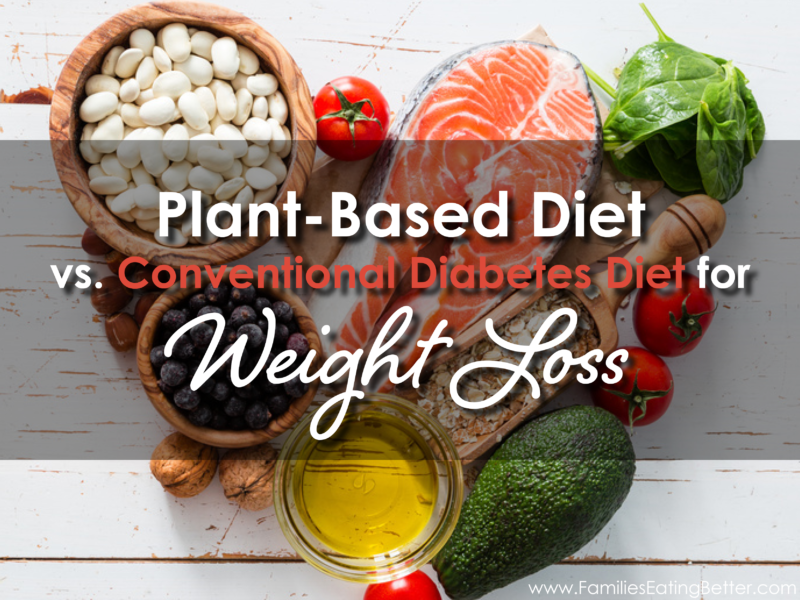If you are diagnosed with type 2 diabetes, your physician may recommend that you lose weight and adopt a diabetes diet.
You have a choice to make. And the choice you make will greatly impact the amount of weight you will lose and how you will feel while trying to lose the weight.
The American Diabetes Association gives direction on 2 different approaches.
- A conventional diabetes diet that encourages lots of vegetables and plant-based protein, but allows fish and seafood, poultry, cheese and eggs, game, beef, pork, veal and lamb.
- A vegetarian (plant-based) diet, which includes lacto-ovo vegetarian (allows dairy and eggs,) lacto-vegetarian (allows dairy,) and a pure vegetarian (vegan) approach with no animal foods.
Since most people are used to eating animal products, they most often choose the conventional diabetes diet.
But how does this conventional approach to managing type 2 diabetes compare with a vegetarian approach?
If you were to eat the same number of calories on a plant-based vegetarian diet compared to a conventional diet, would you lose the same amount of weight? Or would you lose more?
You may have heard that all calories are not created equal. Now a new controlled 12-week study published in the Journal of American College of Nutrition proves it.
Researchers randomly assigned 74 adults with type 2 diabetes to two different diets. One group followed a conventional diabetes diet, and the other adopted a vegetarian diet.
The vegetarian diet was about 60% carbohydrate, 15% protein and 25% fat. It consisted of vegetables, grains, legumes (beans, lentils,) fruits and nuts. This was not a pure vegetarian (vegan) diet, however, and it allowed a maximum of one serving of low-fat yogurt daily.
The conventional anti-diabetic dieters ate roughly 50% carbs, 20% protein and 30% fat.
Both groups ate the same number of calories. A 500 calorie deficit was built into both diets to encourage weight loss.
How did it turn out?
The vegetarian group lost nearly twice the weight – 12.67 pounds – compared to the conventional diabetes diet of only 7.05 pounds.
Same number of calories. DOUBLE THE WEIGHT LOSS.
More Fat Loss
While both groups lost fat that lies under the skin at the same rate, the vegetarian dieters lost more fat in other key areas – the fat that lines the muscles and the fat stored in the muscles.
Getting the fat out of the muscles is the key to improving insulin sensitivity.
“By taking extra fat out of the muscle cells, we’re letting insulin back in to convert sugar into energy. This uptick in the conversion of calories is the equivalent to a metabolic reboot, especially for people who struggle with extra weight, a sluggish metabolism, or type 2 diabetes.” – Hana Kahleova, M.D., Ph.D., lead study author.
More Energy
The vegetarian dieters also felt better.
They experienced more satiety and increased energy. This allowed them to follow the exercise regimen that was introduced in the second half of the study at a higher rate than the conventional anti-diabetic dieters.
Easier to Maintain
Here is something else that is surprising.
Most people think that giving up their cheese, chicken or eggs will make it harder to stick with their diet. But the vegetarian dieters found it easier to stick with their meal plan during the exercise program!
The extra fiber they were consuming definitely helped them feel more satisfied with their meals.
And there may be something else at play.
Our bodies crave what we have been eating. Once you remove the animal foods from your diet and give your body what truly nourishes it, your taste buds change and those old cravings eventually go away.
But if you continue to eat even small amounts of meat, cheese or eggs regularly, you may find that you regularly crave them. You also end up consuming more fat and less fiber, and this just makes it harder to lose weight.
A type 2 diabetes diagnosis doesn’t have to be a condition that gradually worsens.
This study and many others proves that a whole food, plant-based diet can help you take control of your health, reduce your reliance on medication, and lose weight more easily.
You may even be able to reverse your condition and regain normal blood sugar levels.










Leave A Comment